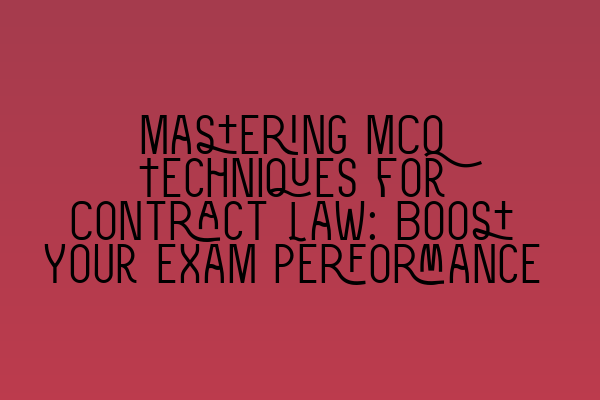Mastering MCQ Techniques for Contract Law: Boost Your Exam Performance
Are you preparing for your Contract Law exam and feeling overwhelmed by the multiple-choice questions (MCQs)? Don’t worry, you’re not alone! Many law students find MCQs challenging, but with the right techniques, you can not only improve your understanding of Contract Law but also ace your exam. In this comprehensive guide, we will provide you with practical tips and strategies to master MCQs for Contract Law, ensuring you boost your exam performance. So, let’s dive in!
1. Understand the Structure of MCQs
MCQs typically consist of a stem (the question or incomplete statement) and multiple options (choices). Understanding the structure is crucial as it allows you to anticipate the correct answer and eliminate the incorrect ones. Pay close attention to keywords like “not,” “except,” or “always” as they can significantly impact the meaning of the question.
2. Read the Question Carefully
Before jumping to the options, make sure to read the question stem carefully. This will help you grasp the context and identify the key issues involved. Underline or highlight important terms, dates, or phrases to avoid overlooking crucial details.
3. Predict the Answer
Once you have a clear understanding of the question, try to predict the answer before looking at the options. This can strengthen your analytical skills and help you distinguish between plausible and implausible choices. Trust your knowledge and logical reasoning to narrow down the possibilities.
4. Beware of Traps and Distractors
MCQs are designed to test your knowledge and critical thinking abilities. It’s common for them to include traps or distractors that seem plausible at first glance but are actually incorrect. Be cautious of options that use absolute language, provide excessive details, or are too broad or narrow in scope. Remember, the correct answer should be the most accurate and balanced choice.
5. Use the Process of Elimination
If you’re unsure of the answer, eliminate the clearly incorrect options first. By systematically eliminating choices, you increase your chances of selecting the correct answer even when you’re unsure. Cross out the options that you’re confident are incorrect, allowing you to focus on the remaining choices.
6. Review All Options
Before making your final selection, review all the options. Read each one carefully, comparing it with your prediction and the details in the question stem. Avoid the temptation to immediately select the first option that seems correct. Take your time and weigh all the choices against the facts and legal principles you’ve learned.
7. Practice, Practice, Practice
As the saying goes, “practice makes perfect.” The more MCQs you practice, the better you’ll become at identifying patterns, understanding the question style, and building your knowledge base. Look for reputable resources, such as past exam papers, reliable websites, or Contract Law textbook question banks, to enhance your practice sessions.
8. Enhance Your Contract Law Knowledge
MCQs are not only about applying the right techniques; they also assess your understanding of the subject matter. Read your Contract Law textbook thoroughly, attend lectures, and engage in discussions. The more you know about the fundamental concepts and principles, the easier it will be to tackle MCQs effectively.
9. Time Management is Crucial
In the exam, time is of the essence. Skim through the MCQs initially, noting the ones you’re confident about and those that require more time. Allocate your time wisely, ensuring you give each question a fair attempt. If you get stuck on a challenging question, move on and come back to it later if time permits.
10. Seek Expert Guidance
Finally, don’t hesitate to seek guidance from professors, tutors, or experienced legal professionals. They can provide valuable insights, clarify any doubts, and offer additional resources to improve your MCQ-solving skills. Join study groups and engage in discussions to learn from your peers and gain different perspectives on Contract Law concepts.
In conclusion, mastering MCQ techniques for Contract Law is essential for success in your exams. By understanding the structure, reading carefully, predicting the answers, eliminating incorrect options, and practicing regularly, you can boost your exam performance significantly. Combine these strategies with a solid understanding of the subject matter and effective time management, and you’ll increase your chances of achieving excellent results. Good luck and happy studying!
Remember, if you require any further assistance or have any specific questions regarding Contract Law or MCQ techniques, SQE Contract Law is here to help. Our team of experts is dedicated to providing you with the support and guidance you need to excel in your legal studies and beyond. Contact us today for personalized assistance and unlock your full potential in Contract Law.
